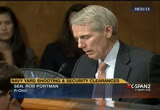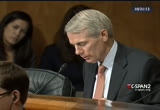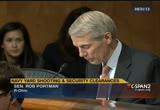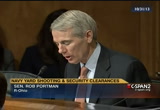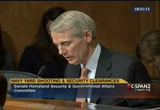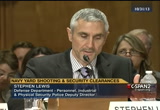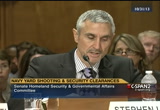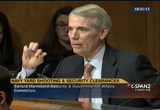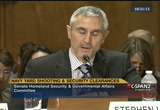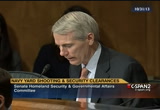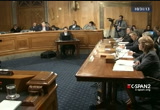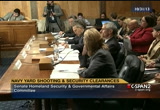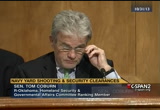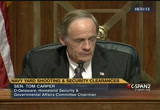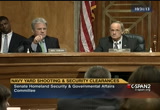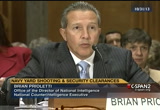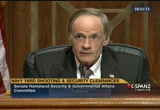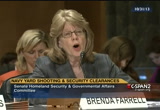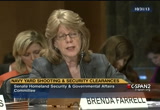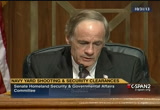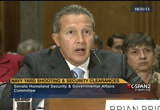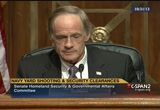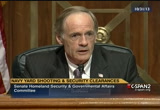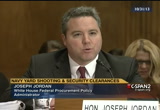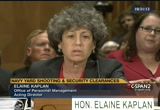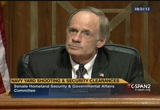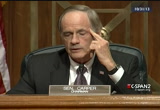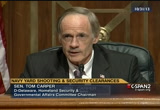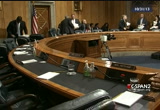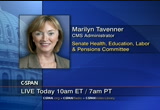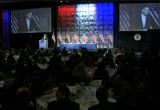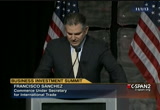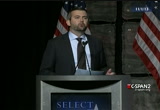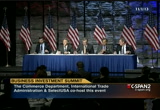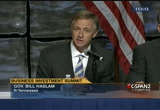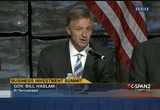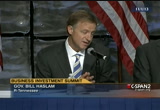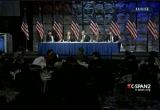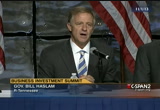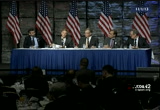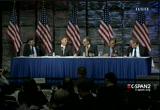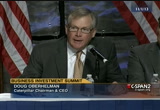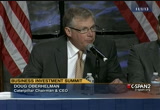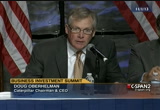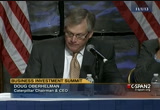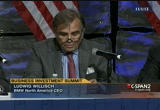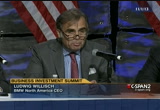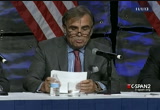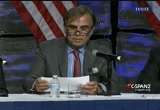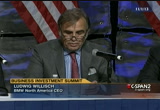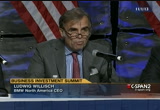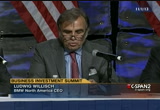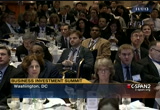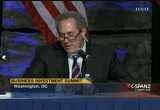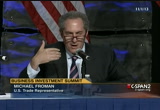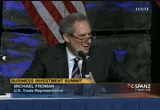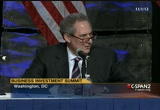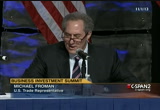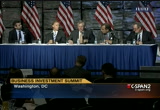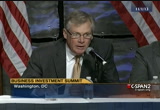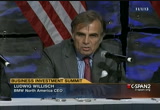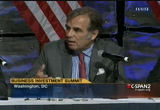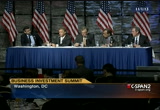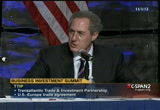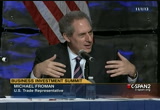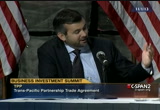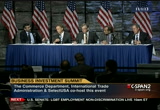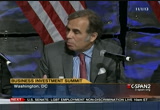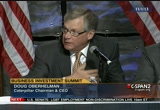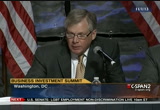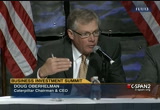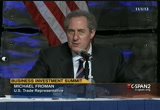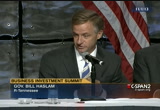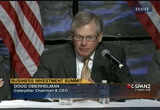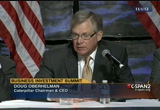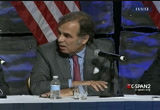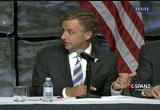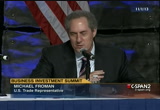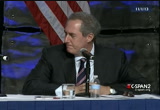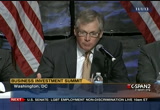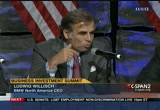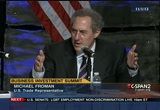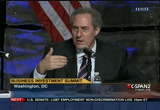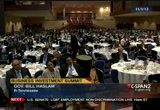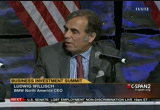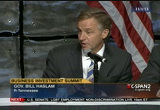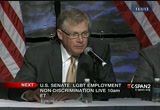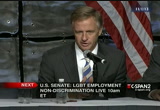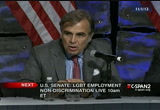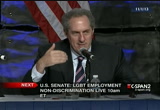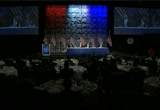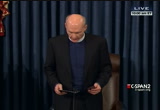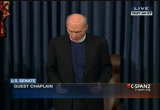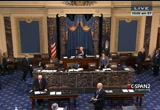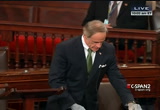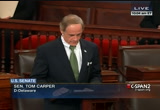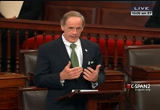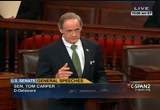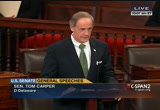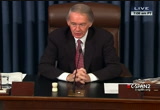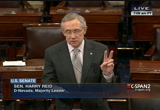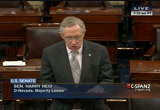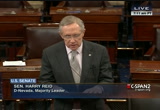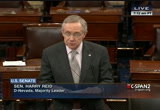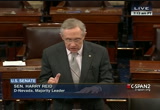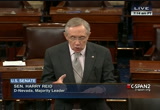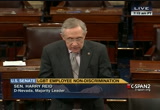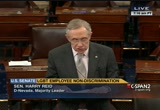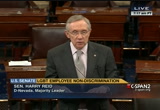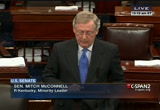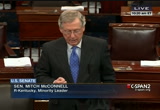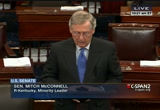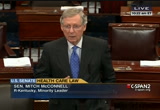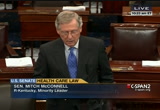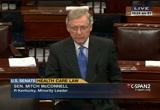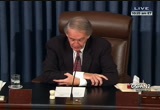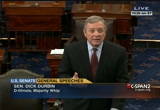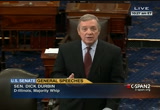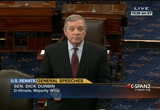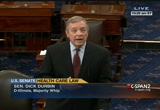tv Key Capitol Hill Hearings CSPAN November 5, 2013 8:30am-10:31am EST
8:30 am
also with this ricky elder case. this is a specialist, ricky elder, who in 2012 shot and killed his commanding officer at fort bragg and then turned the weapon on himself. his clearance timeline was actually reminiscent of aaron alexis'. his background investigation was done in 2006. over the next five years, after 2006, weighs charged twice with assault, once with d.u.i. hit nd run, once with felony assault. none of which was reported in his personnel chain. aaron alexis, similar. after receiving a security clearance, he received nonjudicial -- disorderly conduct. another nonjudicial punishment for being drunk and disorderly and arrest for firearm discharge. a month prior to the incident that would have highlighted his mental health problems, and none of these triggered a re-y
8:31 am
valuation of his access -- re-evaluation to his access of classified material, classified facilities, none of those. and i think this is -- i mean, every issue raised here today is important, but if we can't get to this, the interim period between a clearance and, again, whether it's a five or 10-year cycle, i think we'll continue to have these tragic instances. in 2005, interesting, a year before ricky elder enlisted in the army, two years before aaron alexis enlisted in the navy, the department of defense testified to this committee, and this was in june of 2005, about the automated continuous evaluation system. and you all said you are going continuously evaluate the background. mr. prioletti, in your written statement, you noted three years earlier in 2008 -- three
8:32 am
years later, from the 2005 testimony you gave before his committee, president bush said individual is eligible for -- shall be subject to continuous evaluation. that was an executive order back in 2008. i know we heard today, we're working on this. we heard we have an interagency working group. we're developing a concept of operations. wroit this down. we're doing research. this has going on now for a decade. a decade. if you testified in 2005, was going on in 2004, maybe more than a decade. so here we are. it's five years after the executive order, eight years after this committee heard about the plans, and we're dealing with the tragedy at the navy yard. i don't know who would like to talk about it. mr. lewis, maybe you can talk about d.o.d. by the way, you're talking about putting something in place but not for another three
8:33 am
years and then it would be d.o.d. only. i glass i'd like to hear what is happening. and mr. lewis, since d.o.d. is trying to take the lead to get this in place, i see from the technical report on the project there have been some pilot projects. , and some 600 people have had clearances suspended or revoked due to derogatory discoveries. your search algorithms have found problems. buff 3,600 people is a drop in the bucket when we have over five million people with security clearances. this has been 10 years that we have told that lessons learned is being incorporate understood database that will be in place in 2005, and here we are 2013. taxpayers have paid $11 million
8:34 am
for this i don't know what the development costs are. we're trying to find out. or the cost after 2014 to fully demonstrate its capability at d.o.d. so can you explain the reasons why this capability will take over a decade to field? can you give us some sense of a total cost for this and what it's going to cost to field it over at the department of defense? >> i can't speak to the total cost. i would have to come back with hat information, but i can give you a status of how the automated continuous evaluation system sbg used. it -- is being used. it has the capability of flagging concern. so that's an existing capability. as you mentioned, it was used in an army project. ut of 3,300-odd individuals, a total of 100 personal actions were taken as a result of
8:35 am
information identified during those queries. in addition, the defense security enterprise is developing a continuous evaluation concept demonstration, which would take this a step further. aces, the automated continuous evaluation system, does a one-time snapshot in time query, this concept demonstration would have real time updates so that as information became available it would be pushed into the system. and the concept demonstration is currently scheduled to run from april to october of 2014. the anticipated population would be 100,000 cleared military, civilian and contractor personnel. and so we're anxiously looking forward to completing that
8:36 am
concept demonstration. in their interim, we're uses aces for continuous evaluation checks. again, testing the concept, guess getting more validation. looking at things like privilege users and some other groups of contractor employees. so this is an ongoing effort. we get results from it on a regular basis. and we are looking to take that to the next level in terms of a continue -- true continuous evaluation, which would give feedback to the system as it is developed. so if an individual gets arrested tomorrow, the system would push that back to d.o.d. instead of waiting for d.o.d. to make that query. >> you weren't here in this job nine years ago when we heard that it was going to be in place by 2005, but you're here now. and so, you know, one question i could ask you is, why has it taken so long?
8:37 am
and you might say, i don't know. i wasn't in charge. but you're in charge now, and you're saying that you're going to have this fully operational in three years, is that correct? >> for the automated continuous evaluation system, as it currently stands, it is -- it's an operational system. it's still in a research and development mode, but it is an operational system. the limits right now -- i mean, when i say operational -- >> i mean, when i say operational, i mean it would cover a small percentage of people in between their clearances. you're talking about taking to from 3,600 to 100,000. how many security clearances do you have about d.o.d.? >> we have 2.5 million people who are eligible and in access to classified people. >> when will we cover those people? >> this -- the system, and one of the things we're examining
8:38 am
is can we expand the capability of the system to handle that larger volume? and that is a work in progress and something we could -- >> do you think it's important? >> we, we do -- yes, we do. we need to address what happens between investigations. >> so what are you looking for in order to get this done? you're going to get back to us as to what the costs are. >> yes. >> have you sought additional funding? are you thinking that's the problem? >> it's a question of having the right criteria in place to conduct the evaluations and then what we do with the data once it's generated from the system. how you evaluate that and how you take action based on that. >> my time is up and i apologize, mr. chairman. i think we've got to have some answers on this. if it we don't fix this problem, the initial clearance is incredibly important.
8:39 am
we need to get arrest records. in the case of aaron alexis, it was clear as day. yet, there was no system to incorporate that data. prioletti to mr. and the intel side, i want to hear what you're doing, too. we don't have time but i hope you get back in writing what you're doing. we're talking about d.o.d. here. finally, i hope g.a.o. can help us on this to establish some metrics, let's come up with a timeline that makes sense. if you're looking for additional resources, let us know. if it's going to take another 10 years, because we're doing more pilots and more research and so on, that is unacceptable. thank you, mr. chairman. >> thank you, senator. senator coburn and then i'll wrap it up. >> mr. jordan, can you explain to me the difference in the fieldwork contract and the supply services contract you
8:40 am
have with uscis? one. wo, are contractors -- are these contractors from the same company? >> i can answer the first part. yes, contractors perform background investigations, yes, contractors can perform quality reviews on those investigations but only government employees make a determination as to whether to grant security clearance to someone. >> but my question is, is it the same company that's validating the work of their colleagues doing the investigation? is that correct? >> i'd have to defer to o.p.m. >> no. the companies that are doing the investigations have an only fwation under the contract to also do a quality review but then we do another quality review and the purpose of their quality review is we would like them to catch errors before the
8:41 am
file gets to us but we do a quality review as well. >> so o.p.m. is the final validator of the completeness of the investigation? >> to some extent. i think another thing that validates the completeness of the investigation, it gets sent to an adjudicator who may want more information. ultimately it's a collaborative effort. they may send something back to us but we are the arbiter of whether we have provided an adequate investigative product. >> is every investigation validated by you? >> every investigation is reviewed for quality. >> by o.p.m.? >> yes. >> one other question, then i'll submit the rest of my questions. here's a fund where you charge agencies for this. there's $2 billion in it. has it ever been audited? >> i've told it has not by the
8:42 am
o.i.g. because they told us they don't have the resources which is why we're supporting their request to draw from the revoing fund to give to them the resources they need to do that. > thank you. >> i suspect you'll have to provide a number of anns for the record, but thank you for your answers so far today. today at 12:00, we have a new senator being sworn in and we'll start voting beginning around 10 minutes after 12:00. we'll wrap up here probably about 12:0678 the last question i'll ask -- 12:20. the last question i'll ask each of you, sometimes i say, when you see something awful has happened and you hope some good will come of it. sometimes it does, sometimes it doesn't. a few things could be much worse than -- few things could be much
8:43 am
worse than losing a loved one. ones in as lost loved navy yard not far from here. they would like to know something good will come out of something that was awful for them. i think the american people feel that way as well. one of the last things i'll ask you to do is to reflect on what you have said here today or heard here today and give those families some assurance that out of the tragedy they've suffered through, some good will come and what that might be. so just, last comment. >> i just want to follow up, when you say o.p.m. validates, do you use a contractor to value tate? >> -- to value dade. >> -- validate. >> federal employees. they do a review but we do one as well.
8:44 am
>> so it's federal employees who do a check on the information that comes in? >> yes. >> i want to come back to, i think, a question was maybe asked by senator ayotte and senator highcamp and i want to give you a chance to respond to it. i think it dealt with using social media and the continuous evaluation program. could you give us some thoughts on that briefly, please? >> yes, senator. what i was referring to there is, we are seeking to provide as much of the comprehensive capabilities as possible in the overall investigation of the individual. the more information we can gain, the more enlightened the decision can be on whether or not to grant the access to classify or access to a sensitive position. one of the obvious sources, potential sources of information is social media. publicly available electronic
8:45 am
information. what i refer to in terms of the research with the idea -- was the idea that we need to look at both what possible sources of information are out there, which ones would be of most benefit to adjudicatively relevant information and how do we do that in the best way to protect the personal rights of the individual as well as the veracity and the coverage of the united states government? >> ok, thank you. a couple of questions, a series of questions, if i could, for youing before i ask the questions let me just make a short statement, but when an investigator fails to discover or disclose crucial information during a background investigation, that's an obvious failure. what could be more troubling is the report that efforts by agencies to measure and improve the quality of investigations have fallen short. the office of personnel
8:46 am
management is supposed to review the investigative file and make sure it meets minimum standards. the agency responsible for granting security clearance also has a responsibility to review the file. yet when g.a.o. looked into what o.p.m. and others were doing in 2008 to review the quality of background investigations, it found almost 90% of the reports that d.o.d. was using to evaluate an applicant for a security clearance were missing required documentation. three questions. first, how often were agencies making a security clearance decision without having all of the required information? and what motive did agencies have for doing this? that's the first question. >> the answer is, we do not know ageause g.a.o. performed this sthoifs completeness of the documentation in 2006 and 2009. so we do not know outside of
8:47 am
d.o.d. the naffings you're asking for. this is the type of oversight that we're saying is needed. >> all right. second question. what type of information is missing? can you give us some idea? >> employment verification and discussions with the employers. social references, especially the number of social references in order to determine someone's carblingt. completeness of the application which should be the very first step as we noted before which should be done before you move forward. >> thank you. the third question, has g.a.o. had an opportunity to take another look at the issue since 2008? if you have, has there been any noted improvement? >> we have continued to monitor o.p.m.'s actions to implement ea the recommendation we made at that time. as i noted in 2010, we were very encouraged that there was agreement among o.m.b., o.p.m.,
8:48 am
d.o.d. and the d.m.i. as far as metic reck -- metrics of the quality of the investigation. there was somewhat of a plan to move forward beyond that. we have continued to monitor but at this time, all we know is that that plan has fallen apart. >> ok, thank you. y next question would be for mr. pieletti and mr. lewis. according to some news reports, the company that hired alexis, a company called the experts, had phoned his hotel room in rhode island in august saying he was unstable and that the company was bringing him home. according to news reports, the human resources director of question the experts talked to the mother of aaron alexis on august 9 and she informed the company of her son's past pair noid behavior and state head
8:49 am
probably needed therapy. i would ask first of all if the company had hired alexis had become aware of the increasingly troubled behavior, do you think the contractor should have a duty to report the behavior to the department of defense? and did they report it? >> senator, in this particular case that you just described, in terms of a national security perspective, it behaves everyone to report any unusual activity they see, whether it be a colleague, a co-worker or a subordinate that works for you. >> and the second half of my question was, did they report it? >> to the best of my knowledge, sir, it was reported to the mother, as you described there. i am not positive whether or not they reported it to d.o.d. >> i ask both you and mr. lewis to answer that question for the record. i'll give mr. lewis a chance to
8:50 am
answer it right now. >> the contractor is required to report any derogatory information coming to their attention regarding a cleared employee. the defense security service has done a followup review at the experts and they've determined that the company was aware of the indications of mental instability on mr. alexis' part and they failed to report that information. >> all right, thank you. mr. lewis, stay with this area of questioning, what do you think should be the role of d.o.d. contractors in monitoring the suitability of their employees to hold a clearance? >> this is part and parcel of their responsibilities as a cleared contractor. as a prerequisite for getting a company cleared, they must
8:51 am
execute a security agreement and part of that security agreement is the national industrial security program operating manual. they have been required to do this literally for decades. this is an established process and contractors must execute that responsibility. >> ok, thank you. i ask you to think about a question, i'll give you a little time to think about it, what can you say to those who lost their loved ones, their husbands, their wives, their moms and dads, brother, sister what can you say to them that might give them some comfort to know that out of a horrible tragedy in their lives, our country's life, what can we say today to make them feel some good is going to come out of this? mr. jordan. >> thank you, mr. chairman. i would first say we owe the
8:52 am
survivors of this tragedy and the american people a comprehensive and thoughtful review. what information do we look at? when do we review people in the suitability and security clearance process? how can we improve on all these aspects? the review i talked will be done collaboratively. the reviews, the department of defense reviews and the overarch regular view which all our agencies are involved in. we will act on any improvements as quickly as possible. where there are gaps, we will close them. where there were failures we'll correct them. if i was one of the families of the victims, i wouldn't just want to hear about prophecies and proceed yiffers, i would have some concerns that there's a blue ribbon type creation as opposed to actual improvements to prevent this happening again. i would just say to them, i live near the navy yard. on the morning of september 16, my wife and my 2-year-old son
8:53 am
were playing in a park across the street when they were cleared by police as the trang diwas unfolding in the navy yard. we lost a husband of a senior member of our acquisition community. i would tell them that getting this right is personal to me and we will to everything we can to improve our processes and everything under our power to make sure nothing like this happens again. >> good, thank you. >> of course i would echo what joe said. our hearts were broken that day for the families and for the folks we lost, the federal employees and the contractors and i think in addition to what joe said, this is getting attention at the highest levels. the president is the one that ordered that review and i am sure and i know that he feels very strongly in the same way that joe just articulated that this was an awful loss and we have to do whatever we can to prevent it from happening again. >> thank you.
8:54 am
mr. pierletti. >> i would like to echo the comments of ms. kaplan and mr. jordan. there are no words to describe this loss. a gashe teed commitment that we'll continue to work to find the solution. this is an evolutionary process as we find gaps in our processes and the way we do our business, we will continue to utilize those to come up with the best possible process to improve how we do our business on behalf of the u.s. government as well as the u.s. citizens. >> thank you, sir. >> in addition to what my fellow witnesses have had to say, i would just add that we need to make a commitment and effectively ensure that what
8:55 am
happens between investigations is something that is tracked. we've had people -- we vet people, we trust them with our classified information and access to sensitive facilities and we have an obligation to ensure that we're looking at people between investigations and taking appropriate corrective action as needed. >> thank you. >> i would say it's unfortunate that the tragedies we saw at the navy yard focuses attention on this process but we have seen the dedicated leadership from these executive branch agencies in the past and when they make their minds up to take on a problem and solve it they do it. and now is the time for actions, not just review. >> a lot of folks in the room know that the general accountability office, g.a.o., is regarded as a watchdog. an arm of the legislative branch
8:56 am
of our government to be a watchdog for really the whole expansion of the federal government a huge job. we have a lot of people to do it, probably not enough. but we need your can't continued vigilance to help us do our job and that's the oversight role. theosk probably i think probably the most, the most quoted thing that ronald reagan ever said was one where he said gorbachev, tear down do this wall. he stared at the berlin wall and it was torn down. he also uses a wing is trying to negotiate reductions in nuclear arms with the russians, soviet union, he would say, gorbachev, trust but verify. all of us on this committee, the staff as well trust you and we . the folksresponsi of with whom you work your reformst responsible for carrying through on these reforms, to make sure
8:57 am
it's not just words, but there t are actions to back it up. up. so we are trustful that this ommittee is going to be with gl, you and colleagues will be doing some verification along dg th se way. your nplan, as you go off to your next assignment we wish you well. and we, again, appreciate the preparation time you've given to being with us today. even more, even more we appreciate the commitment of ose, ms. kaplan, who will follow you and those of them the rest of you serve to make sure that these words are words and pre we promise, a promise that we keep your that having been said, thi hearing isis adjourned.rned. thanks so much. captionininstit [inaudible conversations]
8:58 am
>> a couple of life institute about today. on our companion network c-span. marilyn tavenner, head of the centers for medicare and medicaid services will be on capitol hill this morning to talk about the health care law. including her agency's role in healthcare.gov roller. she will testify before the senate health committee at 10 a.m. eastern. at 2:30 p.m. eastern the senate foreign relations committee will be hearing on disability rights and international law. we will also bring you live coverage of the result of today's governors races in new jersey and virginia beginning at 9 p.m. eastern. >> u.s. trade representative mike froman says relations the nsa spying on u.s. allies were
8:59 am
not affect free trade negotiation with the european union. he spoke about international trade at an event hosted by the commerce department. the panel also includes the ceos of caterpillar and bmw north america. this is one hour. >> good morning, everyone. secretary kerry, thank you very much or that excellent, excellent speech. and thank you for joining us on this second day of our somewhat. we had a great day yesterday with president obama, with speakers and panelists at all the networking and matchmaking opportunities that went on. and today promises to be even better. so let's get started. i am very pleased to announce the start of our first panel entitled why like the u.s.a. come using years as a platform. with a great lineup including my
9:00 am
friend come u.s. trade representative michael froman, governor bill haslam of tennessee, ludwig willisch, the ceo of bmw north america, and doug oberhelman, the ceo of caterpillar. but i'm going to let the moderator go into a little more detail on each of our panelists. so let me introduce who will moderate today's panel. neil irwin is a "washington post" columnist and economic editor of them woke block, a widely read blog in the post. at the tragic you can get news on policy and analysis. neil is an author who has covered the federal reserve and let the post coverage of the financial crisis your ladies and gentlemen, please give a warm welcome to our moderator, neil
9:01 am
irwin. [applause] >> thanks so much to the quick introduction. we heard from the secretary. we been through an era in which trade deals where the small piecemeal things with individual companies -- countries. now we're in a moment where big overarching trade agreements are being negotiated across old oceans with europe and with trans-pacific partnership. we have a great panel to discuss those things. first, the governor of tennessee, bill haslam, is from a state that really succeeded on the world stage as an exporter. bill, it's great to have you with us. [applause] >> another of america's great export success stories is caterpillar, the giant exporter of mining and construction equipment. doug oberhelman is the ceo. he is with us today.
9:02 am
[applause] >> caterpillar is a great story of an american company that exports to the world. we have a leader of a great european country that makes a great deal of stuff in the united states, and we're proud to have ludwig willisch, the ceo of bmw north america is here with us. [applause] >> and the man who's negotiating these trade agreements on both sides of the atlantic, the as trade rep is ambassador michael froman. [applause] >> we're going to start with a few comments from each panelist. governor, we will start with you. >> thank you. it's an honor to be. i've been governor of tennessee for three years. one of the things people ask you is what have you learned? the answer is all law. but one of the, one of the quick things you learn is this. international trade agreements
9:03 am
directly impact the job of a state governor, and when i started running, several years ago that certain wouldn't have been one of the key issues on my horizon but it is doubly true. the media little context. in tennessee we are proud of the fact that we still make things. we make a lot of automobiles. we make a lot of furniture which people thought had gone from being produced in the u.s. we had a company just last week announced their moving jobs from china back to tennessee to produce things. we make a lot of medical supplies. i can go on and on but we are proud of effect was to make things. as you'll see from some of my comments the ability to make and sell those things is directly impacted by many of our foreign agreements. in context we sell or export to europe about $5.3 billion a year, about 2 billion to china. penny was talking about foreign direct investment in the u.s. in tennessee we have about 880
9:04 am
different companies located in tennessee. largely led by a lot of japanese companies. nissan came to tennessee 30 plus years ago, and a lot of automotive industries suppliers have sprung up around them. there are 1.7 million americans working in manufacturing jobs with foreign ownership. in tennessee even though we are about 2% of the population i think we make up about six or 7% of that total number of folks in the manufacturing bases with foreign ownership. we are proud of the fact that for the last four years running we've been named the leading state for automotive manufacturing strength. we are proud of the fact that we have the largest cargo hub in the u.s. and the second largest in the world due to small little company called fedex which happens to locate in memphis. which we enjoy the advantage of. we have for international export the element offices i in the uk, in germany come in mexico and
9:05 am
china. tennessee exports are estimated to grow if the ttip tariff treaty that happens that's being talked about, we think or export to europe will grow about 35%. so close to $2 billion would be at stake if that agreement will be passed. we rank second in the nation for the manufacturing jobs created over the last year. first in the southeast in both per capita income growth, and gdp for the last 12 months in the southeast, in the top 10 in the country. we write second, or the second leading state in the country for medical equipment supply exports. about 11% of the nation's exported medical equipment happens out of tennessee even though again like i said where 2% of the population. as in most business numbers like that there's a reason. fedex dominates in the business. and medical equipment if you
9:06 am
need you need it right thing. having fedex as a hub in memphis has made huge difference. as i wrap up let me give an example of three large companies that export out of tennessee and why it's important and why the treaties that we're talking our particularly important. eastman chemical is located in upper east tennessee, has about 7000 employees. it's their global headquarters. the export about one and a half billion dollars a year. if the ttip treaty is fast, it's estimated that would increase chemical sales -- export about $809 a year to europe. we think eastman would get their share of that. nissan is, the headquarters for nissan in the americas and their plant in tennessee is their largest in the western hemisphere. about 14% of the vehicles that they produce are exported. finally, smith is one of those medical equipment suppliers that we talked about in memphis and
9:07 am
the valley of exports is about a billion and there's met tronic, other large suppliers there. on a lighter note we exported the other things from tennessee. export this brown liquid that people seem to know no matter where ago by the name of jack daniels. i sat, i'm the governor of tennessee. the matter what country, they say jack daniels, dolly parton. [laughter] we also are proud of congress and other nice things the export. where kelly will know for music. on a sweeter note we make 300 million m&ms every day. unilever just announced they're building the world's largest ice cream plant in tennessee. from chemicals to auto augusta r we have you covered. let me talk before turn it over, the stakes were talking about in terms of treaties and free trade agreement and impact. soon after comin coming into ofe out of his league locating an suv plant somewhere. it ended up about $1.3 billion investment to get into that locating that in mexico.
9:08 am
ceo besides military there's a whole lot of reason or governors when a plant located in our state. it's an incredible sales job the governor did. we go somewhere else with lots of reasons why it went somewhere else. we think at least one of the reason there was the terrace to import, to export from the u.s., 10% back to europe, 30% to pursue and we are relatively confident one of the reasons that $1.3 billion investment went to mexico was because of the tariff agreement. we think full implementation of ttip with increased tennessee auto exports to europe by about 900 million, and the panelists from vw can talk a lot about the added cost of that and why that's true. let me, if universe wrapped up with. country that we free trade agreement our per capita exports are 16 times, 16 x. times with the countries where free trade
9:09 am
agreement as those that we don't. after nafta, our exports to mexico wind up eight times. to canada, three times. added agreement was struck with chili, our exports to chile went up 10 times. talk about the medical equipment business. up exports for medical equipment costly went up about eight times after the free trade agreement respect. i'll come back to the point i made to begin with, as a governor we are not involved in negotiating treaties. we don't debate them in the senate or the house but those treaties have incredible impact on the things that we do. look forward to discussing more. >> we have an hour. i'm hoping to hear you both capital and bmw on locating in tennessee sometime in the next hour. >> you got it. >> that's why we are here. >> thank you, neil. avenue, thank you for great review. we have a fairly strong presence in national with our financial service business there, several
9:10 am
hundred employees. it's a big business and everyone there is happy. really likes tennessee lots of reasons. >> can you say that one more time? >> ditto. but i'm often asked about manufacturing in america and can we compete from the u.s. on an even level playing field based on every else, and why don't we build anything here? in fact we build awlaki and it's very timely data came from athens, georgia, last evening because yesterday we cut the ribbon on a brand-new greenfield factory, 850,000 square feet, 1400 people strong when it's fully operational at the end of next year. and these will be small old authors and small excavators that were formerly only produced in japan. we brought those to the united states for several reasons. one, we can compete from a base. two, we like this -- support system and a lot of the production was a lot of the production will stick in the u.s. and a lot of that will be
9:11 am
exported to south america and europe. so we feel there's a very good chance and a very good conditions to not only built here but compete from a u.s. base. a year ago we did the same thing in victory texas, south texas on another planet. these would be very large issues, 40-5010 machines that also came in from japan. we will be building those for the first time in the united states and exporting to south america. so some of that is coming back to the u.s. and them very happy and proud of it as a u.s. manufacturing company. in fact, we spent about $6.5 billion in capital expense in the last five years in the united states. we invested heavily here. we've also spent about $10 million in research and development over that same five year period. we have plant after plant in our system in the united states that exports very large mining equipment. solely from the united states. we have factories out in the midwest were 80% of the
9:12 am
production is for export only. we work hard at being competitive both internally in our system at caterpillar but we also work hard with the u.s. government and the michael and many others to open markets outside the u.s. because after all, 95% of our potential customers are not in this country. they are outside and we just need to. over the last five years our total exports have exceeded $82 billion from the united states. those are just from virtually every country in the world at some point or another. i cannot over emphasize the benefits of trade and open trade, but sometimes it's a hard message. free trade, open trade and globalization sometimes that's a pretty tough context in a lot of the small towns where our planes are. that the message that all of us have to get out and work on because without that, without access those 95% consumers outside this country, i don't
9:13 am
know where we will be a generation or two from now. we all need to work on that. finally, as kind of an editorial comment and then i'll conclude, we use action bank and needed to compete on a global basis. export credit agencies are part of a competitive landscape -- extending to other companies use and aggressively. most of our competition if not all of her competition is outside the u.s. they're competing with us for jobs, for our customers, for our people for that matter. we've got to compete and xm has been in needs to be a critical element of the plate as we go forward. so that something is also on the agenda along with open and free trade. as we go for. without i will conclude. thank you. >> neil, thank you very much for having me. bmw certain graces the concept of the u.s. as a viable export
9:14 am
platform. collaborative and free trade initiatives in this country have provided the basis for bmw to make a major investment in the production facility which exports the majority of its vehicles worldwide. bmw group has a success story to share in our south carolina plant. however, there's whether to be done to foster even more economic opportunity in the u.s. with all parties come to the table to ensure more open bilateral trade agreements are embraced. back in 89 when our company was looking to locate a new bmw manufacturing plant in the united states, we received invitations from many state governors. they all had an rsvp attached. obviously, we understand the actual french phrase, and we did respond to all. however, rsvp also has another meaning for the bmw group and is
9:15 am
being held us to determine the actual site we chose. first, rsvp is an acronym for the values that had to be met for the manufacturing facility to be successful. r him as irresponsible. s as in sustainable. v as invaluable, and p of course as in profitable. after evaluating many american sites, supplying our rsvp values we chose spartanburg, softer learned to open the plant in 1994. today, it is in an office success in terms of production and worldwide export. allocated some metrics in a moment but here is how rsvp worked for the bmw group. talking about responsible. we received some offers that while financial attractive to us minot having equally beneficial
9:16 am
for the local business environment and infrastructure, and so we refused them. we felt and still feel that the responsible approach of locating a new facility has to be a win-win for the state, county, city or town, and the local population. responsibility also means being able to provide jobs for skilled local area residents and not rely on the invitation of an outside workforce. a strong network of technical schools and motivated workforce, southeast u.s. and other states in south carolina fulfilled these requirements. also the i-85 transportation corridor provided us with an infrastructure, future export opportunities. so we took the responsible choice and located in south carolina. now to sustainable. bmw is committed to sustainability. in fact, it's been selected as
9:17 am
the world's most sustainable automotive company by the dow jones sustainability index. just a few facts about how seriously we take sustainability at spartanburg. we use methane that normally would be burned in the atmosphere from the landfill to provide 80% of the plants total energy and about 30% of its electricity. we have an 11-megawatt on site energy system. we also have a solar farm to produce energy. with 200 pieces of hydrogen fuel cell material handlers, we are the largest single fleet of hydrogen fuel cells in the world. we are zero waste to landfill for all non-regulated waste. this program has earned us the number one spot on the epa's list of on site green energy producers for the automotive industry.
9:18 am
v as invaluable. our plant provides a onto the local or state economy but the entire country's economy as well. as soon as we open the plant manufactures flock to the area in order to supply us with parts and materials necessary produce our vehicles. today, there are 40 of them in the state and a total of 170 nationwide supporting the plant and contributing to the u.s. economy. we actually committed to our role as a major exporter from the united states. since our initial $300 million investment in the early '90s, with an annual capacity of about 50,000 vehicles we have invested an additional $6 billion over the years, expanded the facility to the point where our annual production is over 300,000 bmws. today, the plant alone employs over 7000 people supporting the
9:19 am
local economy to the tune of $8.8 billion per year, and propose an additional 31,000 jobs through south carolina. from the supplies to our workers, to the local coffee shop, our manufacturing plant in spartanburg is a force that helps drive the economy and an ever widening circle. now we come to the final letter of the acronym, profitable. why we have selected spartanburg in the u.s.a. as an export platform. there are a few facts to help you understand the scope of what we do. currently we produce all ask three, x5 and x6 sport utility vehicles. soon there will be a new export. production in 2012 was 300,000 units. we expect to grow to over 350,000 units this year. and here is the fact i think that may surprise you. 70% of these vehicles are
9:20 am
shipped overseas. that's correct, 70% of these bmws are shipped to about 140 countries worldwide. we are the largest exporter of vehicles from the united states. in addition, we also shipped kids to another six markets around the world as well as individual part that will soon utilize the facilities of the new england ports. all of this export business is profitable for us, profitable for the nation, state, county and local cities, as well as the manufacturing partners that surround us. with humble beginnings producing 50,000 cars annually, our plant in south carolina has become a global success story. by producing exceptional products with a strong group, dedicated workers, our plant continues not only to generate prosperity for bmw, but just back to the region and to the u.s.a. this could only be made possible by the trade agreements in place
9:21 am
to the auspices of the united states and its partners. as positive as all of these may be, there's still room for more comprehensive bilateral free trade agreements. ladies and gentlemen, we strongly support efforts to further open unhindered trade throughout the world and will continue to lend our voices to such efforts. i can clearly state that using the united states as an export platform has been and continues to be the correct and profitable choice for bmw. because we are careful about how we rsvp to any invitation. [applause] >> i'm a native of spartanburg, south carolina and i can vouch it is a very different place from 1994. ambassador froman. >> thanks very much for having me. it is a great pleasure to be here for all sorts of reasons. first, to have colleagues like
9:22 am
secretary kerry, secretary lew, secretary pritzker who have been so supportive, themselves and agencies of what we are trying to do through negotiation of these trade agreements makes a real difference. i'm very grateful for all their support. it's great to the governor's comments about the critical importance of trade agreements to creating jobs and expanding the economy. and when i talk to governors i hear that kind of story and that needs to be told over and over again in this city because as doug alluded to it is a necessary as much understanding of how these trade agreements have an impact on job creation, on growth, on communities and how we can make sure that if we do the trade agreements the right way, this will have a very positive impact on people back home. i'm very grateful to doug and particularly for the leadership role he's been playing in mobilizing the business community to convey that message. look, my job is to talk about how what we're doing on the
9:23 am
trade and investment agreement front helps contributed export platform that was just talk about. as any said earlier this morning, 20% of our exports come from the subsidy of foreign firms in the nested. is a critical part of driving job creation, growth in the united states. we get at those issues through two different things. trade agreements and investment agreements. we have 40 bilateral investment treaties around the world. we have 17 trade agreements that have investment chapters and those chapters give investors here in the united states protection from ex-appropriation, discrimination, from denial of justice, gives them access to neutral international arbitration. and if you are real companies based are doing real work are, it gives them those kinds of protections in other markets that we have agreements with. it protects them from localization requirements it protects them from something called performance requirements where their products might be substituted out for local
9:24 am
products. to our network of bilateral investment treaties is absolutely critical to making this an attractive platform for fort investment to be is not only here in the united states but as my colleague said, for exports in the rest of the world as well. on the trade side we are involved in a number of initiatives. ththe trans-pacific partnership where we're in the india game, where we're trying to do now with the outstanding issues and reach closure. we have a launch of a transatlantic trade and investment partnership with the eu which will deal with those two giant markets and help bring them closer together, eliminate costs, bring the regimes were closer together but when we complete those we will have created free trade with 65% of the global economy. and there are other countries waiting in the wings to join each of those agreements. i fully expect by the time this is over we will be a 65-75% of
9:25 am
the global economy been able to be accessed from the united states through free trade agreements. but why stop there? we've launched an international services agreement in geneva that now covers 70% of the global services market. information technology agreement also in geneva that covers 90% of the i.t. market to have a free trade and a whole sense of products in those markets. and we are pursuing bilateral investment treaties with countries like india and china. and china has made some very dramatic steps in recent months by announcing they are willing to negotiate a bilateral investment treaty with the on the basis of something called a negative list and on national treatment during a counties pre-establishment phase before it gets up and running. those are new breakthroughs with china and, of course, now the details need to be worked out to see whether those can be translated into real and meaningful commitment. you've all heard over the last day all the reasons why it makes sense to invest in the united
9:26 am
states and use this as your platform. i have to say i've been visited by companies from all around the world, some of which are represented in this audience, in recent weeks. who has said that between our legal system, our innovation and ecosystem, workforce, the access to cheap and cleaner energy, that this is a platform that they want to base themselves at. and when you add to that the network of trade agreement that we are currently negotiating, this can be a global platform for exports and i think we will see more and more investment as a result. we are seeing a renaissance of investment in manufacturing to certain sectors we never thought we'd see additional investment in com and we are seeing the expansion of global services businesses here and even investments in our agricultural sector which is a world-class character. we are very optimistic about the u.s. being a platform for global investment and global exports with these trade and investment treaties and agreements provided
9:27 am
a context for that. i'm very delighted this summit is bring attention to that, and it's nice to be on a panel, to be on the panel were everybody supports what it is we are doing on trade agreements. [laughter] and we are very grateful for all of your support as we go forward. >> the place to start is with our executives on the panel. as i alluded to in the beginning, in the last many years there's been a series of one off trade agreements, bilateral trade agreement with south korea, with colombia. now we're in this world of talk about these more sweeping agreements with the eu and with pacific rim countries. as you're making business decisions as the prospect or possibility of these broader agreements, how is that different than those one off bilateral agreements? >> it's highly important to us and outcome at it differently with take the colombia free trade agreement for example. we were very worried that
9:28 am
colombia and a number of our other country competitors we do a free trade agreement, and we would not be included. and what happens with that because so much of our competition is non-u.s., all about in this case, mining equipment going into colombia, we be looking at tariffs for exports to colombia that colombia and japan, germany, sweden, others would not have to encounter. so i would go to our workers out in central illinois and say, look, we have a 10% premium, eight to 10% premium would be and we've got to find way to be more efficient or we will lose the sale. we just cannot find ourselves in that position. so it's critical to us. most of our big equipment from this country is sole source to u.s. we need to have access to those markets that the tpp example is a great one because i'm convinced, michael, most of those countries will sign immigrant with or without us at some point down the road and we will be potentially looking in on the.
9:29 am
i really worry about that as an exporter and employer of some 50,000 people in the united states and what happens to our workers and opportunities as a result of that. >> let me get the perspective from being both an importer and exporter. the x5 cars are going all over the world and wringing from germany. how does the prospect of these agreements affect your business? >> it must have impacted if you're saying we still pay -- just look at the relationship between the united states and europe. we still pay import duties but 10%, we have 5% today owing to the u.s. that sums up year by year to a number of north of 550 million just as costs related to that. it's not only about the import these that we have to pay. it's also about different standards and you wonder why. i mean, it's about crash testing
9:30 am
at it's about emissions standards. it's the same globe, same human beings sitting in the car. yet we have different standards and a cost to the tune of a couple hundred million, just have to develop different cars or encompass all these different roles. so not having these additional costs must have a huge impact on our competitiveness, on our growth as such. i mean, we still have to see what ttip is going to be detailed but we will have a huge impact on us. i.c. today, which is also my responsibility, how well we are doing candidate, how well we're doing with mexico as opposed to brazil or argentina. where brazil, for example, overnight has raised their duties by 30%. so out of this is -- by your very exclusive brand.
9:31 am
>> governor, in a development context how do these agreements matter? >> well, the turnover you start with is we export 16 times more per capita with companies with free trade agreement. we think the ttip w we've been talking about this villages with automobiles, we could just intensity increase our automobile exports almost a billion dollars, which is huge in terms of the jobs created. >> more nissans and volkswagens made in tennessee. >> we have a gm upon as well. we think all of that will help. if you take back the eu there's 10% as ludwig just said, 10% tariff and in another seven to 10% and additional costs due to double checking, crash safety at a lot of other things. you start out at 17, 20% disadvantage, that's huge. >> we just watched canada and the europeans negotiate and
9:32 am
finalize a pretty good agreement which i really hope opens the door i'm many things we could be doing with europe as a result of that. after all, we have nafta with candidate. there's not much of a difference between what they're doing with europe and what we are. that should help us get that done. >> ambassador, give us the scoop. what you see as the prospects for both of these agreements over the next months or years? >> i'm optimistic. we are much further along on tpp. it's been underway now for three plus years. we are in the in game. we're trying to work on the outstanding issues which are still significant. all other countries around the table are working very hard to try and get this done. with regard to ttip, as earlier stage, we've also been spending a lot of time over the last year and have with our european colleagues coming to a common understanding of where we have similar approaches, where we have different approaches to issue. there's no great surprise and i think we know how to work our
9:33 am
way through it. which doesn't mean it won't be very difficult to think it is doable. the great opportunity but also the challenge with the european agreement is we're going to try to bring our regulatory standards systems more closely together. not deregulation, not lower health or safety standards but try and eliminate unnecessary costs, unnecessary friction that get in the way between the two well-regulated markets. and that is something that's going to take some creativity. it's a new area that we're focused on but i think it's one that holds out a lot of promise. the last thing i would add two ducks point earlier, we don't -- to doug's point. other countries are not just wouldn't to see what it is we do but they are out the, after negotiating preferential access to key markets for our exporters. we need to be on the field as well. we need to make sure that not only are we on the field and
9:34 am
getting access to the markets but we are doing in a way that raises the overall standards of international trading system, but introduces new disciplines to deal with the emerging issues in the international trading system. there's a real stark choice out there and we've made that choice. the choices are we going to go for a race to the top where we are trying to raise standards and are tpp partners under ttip artist i think are very much bought into that, or are we going to get dragged into a race to the bottom which we can't and don't want to win. that's what other trading nations might have us do. our goal is to reach these agreements on high standards so we can level the playing field so that our workers here in the u.s. have a chance to compete on a fair and level playing field because they are the most productive workers in the world. we need to have that level playing field if we are going to succeed. >> to be blunt, it's an unrelated issue but to the geopolitical tensions over spying nsa stuff, is that damaging to the prospects for the ttip agreement? >> look, it's obviously a
9:35 am
serious issue that is out there. our view that these issues ought to be kept on separate tracks come in the right lines of dialogue between a party officials on both sides. i think effort from another of the -- a number of european officials that they see the logic of moving ahead with ttip pickets are important for the growth strategy into their strategy to try and maintain competitiveness in the global economy. we are hopeful we can continue to make progress on that. we have teams in brussels as we speak. the our negotiations that had to be canceled during the shutdown of the government but are now back on track. we expect to continue those discussions in the coming weeks. >> ludwig, a number of people include yourself have mentioned regulatory climates. can you give us more detail and what that means in practice? what of the challenges of having different regimes on both sides of the atlantic and what kinds of savings would you be looking at if those were to be aligned better?
9:36 am
>> well, one is crash testing. cars have to be crash tested in a different way in europe than they do in the u.s. your in mexico again, mexico has a european crash testing. so you go over the border to tijuana, there must be some different animal living because there are different crash tests. [laughter] i have to say, if we only can agree that we accept mutually a standards of crash testing that would be already great success. we can have one, either the european audience crash test for europe and u.s. the same. that would be great. but it does add a considerable amount of research and development, i.e., cost to every car we produce and we lose competitiveness. the same holds true by the way for all the admission standards -- the nation stands with the us is more focus on mileage and
9:37 am
europe is more focus on admissions -- emissions. at the same side. we just measure different things. the outcome is the same. so why? >> the cost savings would be in research and design. >> of course. >> we've seen a preposterous situation over the years within europe and the number of countries and this is going to a little bit but a different regulations for backup alarms on machinery. the decibel level, the sound, the frequency. it's impossible to deal with but adds cost to f1. the placement of taillights for example, and lighting on machines very from country to country. >> so you have to make the same construction equipments with a different sound? >> there's an engine change in a manufacturing change. it adds cost but it drives the cost of sort of for nothing. that's something we really need to drive out. just that alone will help us all. >> what do you see on these
9:38 am
issues? >> again, i think there's a comment about this not being a static world, and our competitors are getting better. they have agreements that we don't have. senator kerry was talking earlier about the excellence in u.s. higher education, how that those helpless and we've trained more and better engineers. of those days are ending. and so our natural design advantages i think are going to be harder to come by going forward. and so we need those things so that we are not starting with a 10-20% cost disadvantage. >> we've talked about this and european context are tpp is close to fruition. what would it mean to caterpillar? >> we have a huge business in asia growing. is probably the single largest opportunity over the next decade or so. we have to be there. we intend to lead the market like we do in so many of us. i come back to the point that it's likely that a lot of those
9:39 am
countries, a number of those will get agreements with or without us if we don't get tpp done and will be looking into a market that we ought to be competing with. there's another one i will move to africa because i'm kind of passionate about this. we watched the chinese really take over africa. they've come in with their own financing, their own engineering. sometimes their own workers to take over minerals, extraction, oil and gas, hydroelectric power across africa. i think we can do better in this country and i know, michael, that's on your agenda. i'm so pleased to hear that the crossover between commerce and state because that's what we really need to that's what china and others do so well when you look at a market. they combine all other assets, all of their possibilities to go after business and try to win customers over. i think we can do that and i admire, i think the commerce state combination can be very fruitful. would like to help with that as well.
9:40 am
it's a great opportunity. >> ambassador, the trade promotion authority is a big issue. what you see as the prospects in congress for you to get fast tracked? what would it mean if you don't -- can you successfully negotiate these agreements if that's not part of the equation? >> the president has made clear that he would like to get trade promotion authority. is a critical tool for being able to move these agreements. agreements are real and implement them. just this week there was a hearing in the senate finance committee on ttip actually where chairman baucus and senator hatch both talked about importance of moving forward on trade promotion authority and we're working with the finance committee and the ways and means committee both democrats and republicans to try and move this forward as quickly as we can with broad support as we possibly can as we possibly could have. we think it is a critical, it is
9:41 am
a critical tool ultimate to getting agreements through congress and implemented. that's why we want to get it than. >> i mean, i assume if you're committee deals commute like to see it and you'd like to see the u.s. government have a strong negotiating position as possible? >> right. at the end of the big one of the things we understand intimacy is governments don't create jobs. that we do set the conditions for that to happen so we worked hard in tennessee. we have the lowest debt per capita. one of the most two or three tax rates and with great infrastructure. we've done all the things that we think that we can do to help this be a great productive work environment. but there are certain things that are out of our control that dramatically impact jobs in tennessee. so when i hear out of my new vouchers tell us we love being in tennessee, we love the work environment. but if we had this agreement in place we could produce x. more jobs. it's a little frustrating as the
9:42 am
governor because of something that's out of my control but it's also critical for me to get involved to land that voice whether it's in washington or anywhere else i can to raise it. we've worked hard to set up a great working environment in tennessee and we think we have it. there are certain things that are beyond our control at this point. >> sso i understand it will understand this and it is used to these agreements but i think we want to be clearheaded about some of the competitive cost. in the construction money this is what d.c. as the competitive threat that would come from others who could -- imports would be less expensive. what are the competitive challenges you will face and how confident are you that caterpillar can fight them a? >> well, that's a great question and one we are battling on many other fronts. it comes back to really the competitiveness of the united states. you get into things like the education system, our taxing system and all the things that make u.s. companies competitive,
9:43 am
vis-à-vis our competitors around the world and that's another broad subject we could probably spend days on as well. but to have a level playing field between ex-im bank and tariffs and the ability to penetrate markets that are open is kind of the foundation of all of this. i think past that it's obvious companies to be as competitive as we can and it's up to the american government certainly to help us all be as competitive. we tend to great new jobs and job growth. i kind of look at it in those, three steps of foundation work, but the opening of markets is fundamental to starting the process. we can be competitive as i've described. we export an awful lot to the tiny. we work hard every day on internal labor agreements, we spent a lot of time on her education system. if we don't have those markets to start with, the rest of this is sort of benign. we've got to be there to play. >> ludwig, again in the auto
9:44 am
business what you see as the competitive threat you would see as these come from more important? >> we love free trade and love competition. that made a strong over the last 50 years, from a humble company with 4000 employees in the early 60s to way north of 100,000 today. we are the most successful manufacturer in the world, meaning that in europe for example, which is still our biggest market to have free trade and we take our competition on and see who is the best. if we are not afraid of anything, that means competition. [talking over each other] >> not skewed by protectionism. that would be really what we are looking for, unilateral free trade that would certainly grow our business. >> governor, same question. what are the chances that workers and manufactures a in tennessee have that you are confident anymore level playing
9:45 am
field they will prevail? >> at the end of the day it's going to not having the right trained workforce, and we're doing everything we can to make certain we have enough engineers and enough welders come in of i.t. professionals to provide the product. we realize there is a dance at the part of the question is a downside? there are. we not only make cars and medical equipment. would also grow a lot of grow a lot of tomatoes and tomato farmers would tell you since nafta, their tomato sales are down. they also say hey, ours are better and in the long term we are going to win. we realize you're opening up our markets to that process, but like ludwig said can be kind of believe in competition. we will take our chances in that world. our job is to set the right structure, make sure the right environment, very predictable so you know what they're dealing with and to make sure we're training the right workers. we think we're doing that. >> do you see any ways that some of the losers in these trade
9:46 am
deals, some the industries that face more competition for more challenges, is there a way to help those workers, to ease somewhat difficult to? >> absolutely. when president obama came into office he wanted to make sure we're negotiating trade agreements that the benefits would be broadly shared and where we recognize we need to take care of anybody who is displaced. that's why we've always insisted, for example, a trade at just the assistance. trade adjustment assistance is a program that helps workers who are displaced, expires in two months. it's always been linked to trade promotion authority. so our hope is as we talked about before as congress takes up trade promotion authority that they will marry it with a trade assistance and we can move this forward. let me just say one more word about that if i can. the trade promotion authority, there's a lot of misinformation after. it's the mechanism by which congress gives us our marching orders. they tell us what to negotiate, how to work with him during a
9:47 am
negotiation and with conditions will be under which they will consider an agreement to approve or disapprove it. and we work extreme close with congress to every trade negotiation hand in glove in every state. trade promotion authority is way that the package structure. last thing i would citizens been part of our overall trade agenda, it's not enough just to negotiate peace agreements. we got to make sure we wanted him and we enforce them. we dramatically increase our enforcement efforts throughout this administration by bringing more cases to the wto where necessary using our trade laws, bringing the whole of government approach to our enforcement efforts through something called into agency trade enforcement center. and i think that has helped convey to people that we want to make sure that this works for american workers and farmers and ranchers across the board. >> you have a unique opportunity to you here on a panel with the man who's negotiating these big public at agreements. there's inevitably trade-offs.
9:48 am
what does he was pushed hardest for? what are you willing to concede on to get the deal done? from the perspective of tennessee or from caterpillar or from bmw, what would you urge the u.s. government to focus on as they make these trade-offs between service industries and auto and farmers and all the different interests involved in these negotiations? >> i've start. -- i will start. i think in all these it is a series of copper misys, and my encouragement would be, and i would say that ambassador froman is one of the best in the world in my opinion with the terminus background. i have great trust. you start with big chunks of things that make a difference. you whack those off any and, you make the compromises in the places you have to compromise. you have to be as broad as you can to cross as many industries as possible to get done. i know exactly it's a michael does. it's hard to say because unless you're in the room negotiating a
9:49 am
deal, what you can compromise on but to me it's very broad and get as much as we can get, the better off we will all be. in the i'm not going to stand -- of the long list of things i would like to have but i'm not going to do that. >> i don't know that i have a lot to add to the. i do think that in any negotiation you start with how much is at stake. i think there's a lot at stake. so my encouragement would be like doug's. don't let the 10% of things that are most the difficult but still our only 10% of the thanks stop it from happening. >> i couldn't agree more. we should not strive for the best of all agreements. we should settle for good agreements and, in fact, the agreement would include that we can't do away with different standards that we would accept a standard that we have in the u.s. and europe and likewise,
9:50 am
would make things easier for his. >> it's important to remember that there's a lot of change that has to come to the u.s. in some of these fields but i would go to agriculture as one that has frankly been a stumbling block for many, many years to get some of these done. and as a result that has to be managed as well. it's a very difficult set of negotiations when you're going after some of the very backbone that what has made a country what it is. >> i'm afraid that is the same in europe. >> japan as well for that matter spent ambassador froman, tells the pathway from your. what is the next bit of time look like as you understand try to come to a deal to? >> i think as this discussion demonstrates, what -- the challenge before us is that even within the u.s. we oftentimes have stakeholders with diametrically proposed interests. and our job is to figure out what the best approach is, what will support the greater -- the
9:51 am
greatest number of jobs, the most growth, the most benefit for the u.s. economy. to come up sometimes that requires a balancing even among domestic interest, and then to go to 11 other trading partners in the case of ppp or the case of eu in the case of ttip and figure out the landing zone where it's a win-win for everybody. nobody gets 100% of what they want and 100% of the chapters don't have to be able to at the end of the date look at the package as a whole and that's what we tried to take as a conference this approach is possible. make sure that it is serving both our interest and our values and that it's supporting what we need to support here in the united states in terms of job creation, growth and strengthening the middle class. those are our watchword. everything is tied back to those three objectives. we will be working over the course of the next couple of months on tpp and is ttip gets up and running, to get to those objectives. >> hopefully there are no more government shutdowns to stop
9:52 am
your. >> indeed. >> a couple of you have mentioned agriculture, which is not really represented up here today, though governor, you have the tomato industry so i'll use you as a proxy. what do you say to a tomato farmer, somebody is being asked to make real concessions on what kind of subsidies they receive for agricultural work? >> right, and that is a difficult piece. like i don't know the number but i have seen some of the number and tennessee produced no versus pre-nafta and there has been a hit. a couple of things. number one, at the end of the day i think food today is more and more about quality. number two, it's about access to markets. the whole, you know, farmer to table to has become huge opportunity for local growers. i would say let's keep concentrating on the markets that you know you can do well on with quality. you know, again, we will keep specifying tomato farmers.
9:53 am
i'm pretty confident your tomatoes can be better than those brought in. >> nafta has been mentioned a couple times in the context of autos. you can export to mexico, quite easily brazil, there certainly a high tariff. what are the lessons of nafta over these last 20 years? and what implications do they have for how these agreements come to be? >> obviously nafta i would go as a model case how we should move on but i would also like just to stay in the american context, just to see how it works now with south korea where we are free trade as well. we are doing great with south korea, even though they have a strong automotive industry themselves. so i think it really is about embracing free trade wholeheartedly, and work on it. >> any lessons for caterpillar? >> i think virtually all of the
9:54 am
empirical data and evidence will show that nafta has been a tremendous winner for all three countries, and especially this one. for our company it's been huge. we been able to take advantage of a tremendous oil and gas business in canada. a lot of development in mexico, and a tremendous benefit to the u.s. so without nafta i don't know where we would be, frankly, whether export and trade to both mexico and candidate i think the mexicans and canadians i know would tell you the same thing. it's a better spent what has been your expense with nafta 20 years later? >> go back to this is what our exports to mexico, we are up eight times, and to canada of three times. and so are the winners and losers in the process? yes, but net, the state is way ahead, eight times with one company, three times with the other. >> let me just add a metric your, and that's basically only true because of free trade agreements that we have a round
9:55 am
globe the last 20 years. our production the last seven years i was a where it uses a model cycle has gone up in u.s. by 40% but exports have gone up by 70%. so that really shows how free trade fosters growth. >> so i guess to close up, i would ask each of you to think through and get just a couple of comments on what you expect the world trade look like in the next year or two, and what you would hope to see. what other great opportunities, great risks and the most likely outcomes, the things that you would expect to see out of both the european and the pacific agreements? >> well, i have very high hopes that we will see a deal on tpp fairly soon and ttip right behind that. then with the job creation that we are all lacking, even at this
9:56 am
point in asia, europe and the u.s., i would expect to start to see the benefits of that a year to two years later as were starting to see with south korea and kalinga today. it doesn't take very long -- colombia today but it doesn't take very long to open the spigot once the tears come down, standards are synchronized and so on. so i would be pretty optimistic that they would help job growth and gdp growth in all three zones, but particularly this one because again, 95% of our consumers are outside this country. we've got to learn to deal with that. >> governor? >> directly, i don't have the number on the pacific, but with the ttip agreement we think are exports will go up 35%, which is about $2 billion which is a lot. i think of the things you have to look at everything in context of what's happening in the broader market and there's somethings working to our advantage. energy costs in the u.s. are going down.
9:57 am
that's not true and a lot of other countries around the world. we can take advantage of that. the logistics cost of transferring goods are getting to be a bigger piece of something relative to the labor piece of you. so we can take advantage of that as well. i just think the market in so many ways is turning to our advantage right now, and it would be, in my mind, it would be a shame if we didn't create those additional jobs because of not having these agreements do done. >> ludwig? >> we should always keep in mind ttip, free trade supports growth. it supports new jobs, foreign investment, innovation. so in the end, the consumer benefits from all of that. it creates jobs, and in a world of free trade there will be production moving to those
9:58 am
countries where there is free trade, and free trade will always foster exports. >> ambassador, a year from what will we hear and what would you like your? >> i'm very optimistic. i share the governors optimism about what the us will be in the global trading system. when you look around the world, including in southern africa, across asia, in parts of latin america there's a real movement towards recognizing that open markets, providing your dude in the right way, opening markets can really help drive job creation growth, innovation. look at what the pacific alliance is doing in latin america, with some of our partners are doing in southern africa, some of the leading reformers in african country. there's a desire to make sure that the trade is playing a major role in their development. that investment is playing a major role in their development. and the u.s. stands to benefit hugely from this shift in the global economy provided we can do the things we need to do
9:59 am
here. our biggest risk is our political risk. is getting our fiscal house in order, getting comprehensive immigration reform done and it's getting these things on trade through our congress as well, starting with trade promotion authority which doug reminded me, every president has had since 1974 but also tpp, ttip, the of the things we need to do to make sure that we are at the center of this network of agreements that together with our legal system, education system, our access to energy, can make this was the driver of the whole export, the platform that every company about the world wants to be in. and that to me as a great, great potential for the united states economy and for job creation and growth here at home. >> and with that we will close down. thanks so much for all these thoughts. well done. [applause] >> the u.s. senate will gavel in in just a couple of moments to senators will continue work on moving ahead on a bill that would ban employers from using
10:00 am
an individual sexual orientation or gender identity as a basis for hiring, firing southward or promotion. the same rules would apply to labor organizations that implement agencies. sapper republicans help advance the bill yesterday are expected to offer amendments seeking changes related to religious organizations. the senate will break between 12:30-2:15 eastern for the usua party lunches. live coverage of the senate right now onin c-span2. revereny knox james of welch -- the westminster presbyterian church in wilmington, delaware. reverend jones. the guest chaplain:let us pray. mighty god, creator of all that is, we give thanks for this great nation - for its bounteous resources, its diversity of people, and for its principles of liberty and justice for all - not only for the privileged, not only for the powerful, but for
10:01 am
all; because each of us is one of your beloved children. call forth the best in these servants, that they may bring honor to themselves and instill confidence in those who have entrusted them with breathtaking responsibility. banish from this historic hall small-mindedness and mean-spiritedness that parade as purity. instead, bless these men and women with that rare and priceless virtue of humility. holy wisdom, bolster their courage that they may always refrain from hollow rhetoric and selfish gain, and instead strive for decisions that bring great promise to all people. enable them to glimpse your vision of a world where those who are ill are cared for by the compassionate and the hungry are filled because the well-off are generous.
10:02 am
embolden each person in this chamber with a burning desire to do the hard work of governing, that each may become a true servant of yours and of this nation, so that they may become a model of inspiration to our children and grandchildren, and lead us to a future of promise. amen. the president pro tempore: please join me in reciting the pledge of allegiance to our flag. i pledge allegiance to the flag of the united states of america and to the republic for which it stands, one nation under god, indivisible, with liberty and justice for all. mr. reid: mr. president? the president pro tempore: the majority leader. mr. reid: mr. president, i'm wondering if my -- obviously not. following leader remarks and
10:03 am
those of senator mcconnell the senate will proceed the motion to proceed to proceed to s. 815 postcloture. the senate will recess from 12:30 to 2:15 for the weekly caucus meetings. i hope we can reach agreement to move forward on the bill today. mr. president, i'm wondering if my friend from delaware wishes to make a speech regarding the guest chaplain. if so, i'd be happy to yield to him. the president pro tempore: the chair recognizes the senator from delaware. mr. carper: thank you, mr. president. my thanks as well to the majority leader this morning. before i say a few words about reverend gregory knox james, i want to go back in time for a couple of minutes. i was talking to the pages out in the hall about how we, when our country was first settled
10:04 am
folks came here from all over the world. they came here in part in pursuit of religious freedom. they were people of different faiths. they wanted to be able to worship god as they saw fit. one of the -- when things got really tough in philadelphia in the constitutional convention trying to wrestle with issues like slavery, rights of women, whether there should be big states, little states, how we're going to be represented here, many time the founding fathers hit the pause button and called in someone, a person of faith to pray, to help them find a way. and they did it again and again and again. when george washington was inaugurated not here but in new york city, at the end of the day they didn't go off and have big parties. they actually went to church. in the early days of our country worship services were actually held here, as some of us know. we start every day here in the united states senate with a prayer. oftentimes delivered by our pastor, navy admiral barry
10:05 am
black, our chaplain. today our special guest is my pastor, gregory knox james from westminster presbyterian church. our leader, harry reid, mr. president, has run a number of marathons. so has our guest. he's a long distance runner literally and figuratively. he ran his tenth marathon, the new york marathon on sunday, had good time. i'd like to say, mr. leader, he won the category, white men over 50 who pastor large presbyterian churches on the east coast and were former team captains for kansas state university football team, that category he won hands down. i congratulate him and i'm sure our colleagues do as well. he reminds us every sunday of the idea that we have a moral i imperative to look out for the least of these in our society, people who are hungry, need to be fed, people who have no place to live, people who have no health care, we have an
10:06 am
obligation to look out for them. we have not just an obligation to look out for those in our community but way beyond our borders like those in kilowatt mall la, those -- like guatamala, those who live in israel, the west bank of jordan. he reminds us every sunday of the golden rule. who is our neighbor, treat others the way we want to be treated. we have to focus on the poor, widows and orphans and those who are in need. he reminds us to not just talk a good game but to actually do, deliver on our words. saint james 2, show me your faith by your words, i'll show you my faith by my deeds. he reminds us of that every sunday. to my colleagues he reminds us we are servants. great sermon from mark chapter 10, the words as i recall, i'll paraphrase him, to those who want to be a leader you've got to be a slave to all. for those who want to become
10:07 am
first, you must become last. we thank you for those remembrances. every week i go to bible study led by our chaplain. on sundays i try to show up in our own church. it reminds me, mr. president, of a double shot. you and i are about the same age. remember the days of motown called double shot of my baby. every week i get a double shot of god's love from these men, my pastor and our chaplain. i'll close with this, his wife and children and grandchildren are honored you're here. i want to close the way he closes our sermon every sunday colleagues. he does with these words, i hope i've got them right pastor. it goes something like this, when he lets us go and dismisses his flock, he says these words: may the love of god, the grace of christ, and the fellowship of the holy spirit bless you, those
10:08 am
you love, and the ones that no one loves. and the ones that no one loves. and he sends us on our way. those are great words for us today as well. we welcome him and thank you, mr. leader for giving me a chance to say these words today. mr. reid: mr. president, i'm tolds h.r. 42 is due for a reading. the clerk: h.r. 32 # -- 3284. mr. reid: i would object to further proceedings at this time regarding this legislation. the presiding officer: objection having been heard, the bill will be placed upon the calendar. mr. reid: mr. president, i've spoken to the republican leader on more than one occasion, but i want to make sure all the members understand that we have
10:09 am
a -- this is a four-week work period. we're in the second week of a four-week work period. we have certain things we've outlined that need to get accomplished. i hope everyone understands things we have to get done this week, next week and the week after. the reason that we're pressing so much work into this limited work schedule is, first of all, it's necessary for a number of reasons. and secondly, the senate has worked over the last number of years really hard during the holidays. our families -- i've traveled, trying to get home for christmas. i leave here on christmas eve. i've done that twice. and it's been extremely difficult for christmas, thanksgiving, and of course new year's. it's wonderful to be able to go
10:10 am
home to our families, our friends, but also, mr. president, we have work to do. we represent our states and there are things we can't do when we can only go home for weekends. and some of us who live a long ways away, it's a day to get there and a day to get back, and so it really is more complicated for those that live west of the mississippi. so the whole point, mr. president, is to indicate to everyone we're going to try to take thanksgiving week off and the week after. the republican leader and i, we really want to get that done. but we can't do it if we're held up on procedural matters that are unnecessary. so i've outlined what we need to get done. i've explained this to the republican leader. i've explained it to my caucus on more than one occasion. the issue at hand, mr. president, is this. we have a few weekends left. we're going to be out monday
10:11 am
because it's veterans day. but all weekends until we leave here for thanksgiving are going to be work weekends in order to get our work done. so, i know people have schedules, but understand you better keep them pretty loose. otherwise you're going to be missing some votes around here. we voted last night and we were able to move that, get past the cloture aspect of that. we have a way of going forward on this. there's no reason to eat up the whole 30 hours that are postcloture. i'm just telling everybody who is in effect forcing us to do this that it may impinge upon the holidays, the situation dealing with thanksgiving. i would hope we could get out of here on the friday before thanksgiving. but it's up to people who have gotten in the habit of having unnecessary delays.
10:12 am
so i need not say more. i really would like for me personally and for the senate, democrats and republicans to have those two weekends off. so take a look at where we are postcloture on a motion to proceed to enda, employment nondiscrimination act. mr. president, i was disappointed to read yesterday that speaker boehner opposes the employment nondiscrimination act because he believes it will lead to frivolous lawsuits. but coming from the man whose caucus spent $3 million in taxpayer dollars defending the unconstitutional law of defense of marriage law in court that is pretty reach. i thought it was necessary to protect the speaker's claim to protect lesbian, gay, transgender and bisexual fired
10:13 am
because of gender identity would risk american jobs. mr. president, to the contrary, according to a study by the united states government accountability office -- nonpartisan -- in 21 states that have some protection against this kind of discrimination, relatively few lawsuits have resulted. almost every state with antidiscrimination law that protects workplace information against lesbian, gay, bisexual or transgender individuals had fewer than ten lawsuits filed between 2007 and 2012, according to the study. in fact, lack of one clear consistent federal standard protecting against this harassment actually creates more confusion for business and local government. so i was also stunned when the speaker said today he wasn't
10:14 am
going to bring it up for a vote. yesterday he said he didn't like it. today he said he's not going to bring it up for a vote. if it came up for a vote in the house, it would pass. we can look at a number of examples of this litigation aspect that he raised. take the example of kyle nave, a veteran police officer fired from the audobon police department louisville, kentucky after three years of being terrorized by his supervisors. after speaking up against the harassment, he was fired. kentucky is one of 33 states with no statute preventing discrimination on the basis of sexual orientation or gender identity. but louisville has a local nondiscrimination ordinance, and the department had a reupb policy against sexual -- had a written policy against sexual harassment although it did not expressly protect against discrimination based on sexual orientation.
10:15 am
so officer nave filed two separate legal complaints against his former employer. those complaints are still pending. if there was one federal law protecting all americans from discrimination instead of a patchwork of ineffective state and local laws it would be simpler and less confusing for businesses and employees alike. that is one reason more than a hundred of the nation's large employees support the enda and why most fortune 500 companies already prohibit prosecution based on sexual orientation or gender identity. those companies know that to remain competitive, they must foster an environment where all workers reach their full poe teption. not only is comeerveg bainers's claim untrue, it is also callous. it fails to take into account the heartbreak and suffering not to mention lost wages and
10:16 am
productivity that workplace discrimination causes he have year. when kyle nave was hired, he had already served two decades as a police officer with other departments. this is are what he said yesterday. "i have been a law enforcement officer since 1989 and have never experienced anything like what i've experienced with my preeves employer. i wasn't going to let them push me out of a job that i love." so for thee and a half years, kyle endured torture at the hands of two of his supervisors, including the chief and the deputy chief. although coworkers described officer nave's on-the-job performance as exemplary, his supervisors called his derogatory names, told gay jokes in front of him and about him and directed profancy-laced rants towards him. this is the chief and the assistant chief.
10:17 am
this is what officer nave remembers about trying to get through the ordeal. "each day i kept thinking it was gointhinking it isgoing to get . but it didn't. as a police officer you are supposed to have thick skin but it never dpot any better." then last year two weeks after officer nave filed a formal comaints with his chief, he was fired based on the charges of insubordination. somebody who had been basically a police officer for a utter request of a century. for the first time since he was 16 years ago kyle was unemployed, as he is right now. he's still unemployed. and although kyle would love to return to police work and doing the job he loves and did for a long, long time, no department will hire him with the termination on his resume. with one simple federal law in place, which is the enda bill, people like kyle could go to work without fearing such
10:18 am
torment. every american zev's that right and protection. every employee diseives to be judged on the quality of his or her work instead of their sexual orientation or gender eye denyty. -- identity. mr. mcconnell: mr. president? the presiding officer: the republican leader. mr. mcconnell: almost a year ago now, michigan goafn rick snyder signed historic right-to-work legislation into law. at the time he said he viewed it as an opportunity to stand up for michigan's workers, to be
10:19 am
pro-worker. the union bosses, the entrenched special interests and the professional left have stood in united militant disagreement, but michigan's soft-spoken goafn was right, and the more venom big labor directed at him, the more it seemed to confirm the is suspicions that snierd woos trying to help. he was in fact on their side. the truth is over the years, big labor has come to care more about its own perfection and power than the workers it was charged with protecting. snyder knew that, and he knew it was time to tip the scales back in favor of workers. well, he's not alone. here in the senate, senator paul and i share senator snyder's commitment to helping restore workers' rights. that's why we filed an amendment that would snact enact similar reforms at the federal level.
10:20 am
our right-to-work amendment is simple enough. it merles calls for repealing the jim in atory clauses in federal law that allow as a condition of employment forcing workers to join a union or forcing workers to pay union deuce. in -- to pay union dues. here's what that would maintain for middle-class folks. you want to join a union, you request. if you don't want to join a union, you don't have to. that's t that's all this is about. this is just common sense. it is basic fairness. according to one survey, about 80% of unionized workers agree that employees should be able to decide whether or not joining a union is for them. but this amendment isn't just about ending institutional discrimination against workers. it's also about job creation, economic growth, and making america more competitive in the 21st century. consider the fact that
10:21 am
manufacturing imhoiment is one-third higher in states with right-to-work laws or that according to a recent study, states with right-to-work saw improvements in real personal income andage of annual employment compared to what they would have seen without such laws. or that many of our nation's labor laws were passed in an earlier era, in some cases before many folks even had television sets. america's labor regulations are antiquated and they need to be updated for the modern world. that's what the flex-time legislation i introduced last weeker sought to achieve. that's what right-to-work seeks to achieve as well. creating jobs, protect the rights of workers,keeping peyses with the modern world. that's what right-to-work is all about. it is just common sense. in states like michigan, with proud traditions of organized labor, can look their problems in the face and act, then it's
10:22 am
time for the federal government to act, too. so i would urge my colleagues to join senator paul and me in supporting this important amendment. now, mr. president, i'd like to say a word about obamacare as well. i want to remind my colleagues that the president is absolutely correct. he's correct when he says that obamacare is about so much more than some flawed web site. it's about people. people like the california woman with stage 4 gallbladder cancer whose story we read about p in "the wall street journal." i'd like to read some of what she wrote. "i'm a determined fighter and extremely lucky, but this luck may have just run out. my affordable lifesaving medical insurance policy has been canceled effective december 31. here are the impossible choices, she says, she is least with.
10:23 am
she can either get compleg through the exchange and lose access to her cancer doctors or she can pay up to 50% more's a, as she put it, "for the privilege of starting over with an unfamiliar insurance company and impaired benefits." now, mr. president, that's just not right. it's not what the president promised, and it's not the kind of health reform americans asked for. so we should keep our focus where it belongs: on the real people getting hurt by this law. but that doesn't mean we should stop asking questions about healthcare.gov, too. because if the government can't even run a web site that it three years -- three years -- and hundreds of millions of dollars to create, can americans really entrust the same bureaucracy with even more power over their health care? the calamitous rollout -- calamitous rollout -- reminds us that we do not even know if data being submitted over this web
10:24 am
site is 100% secure. and in today's age of digital scammers, there is a real concern for my constituents. identity theft is about the last thing americans need to be dealing with right now, especially with everything else this economy and this law have been throwing right at them. they're really mad enough about the president's repeated, unequivocal claims of, if you like it, you can keep it. the white house keeps trying to message its way out of of this whopper, but no matter what they say, the reality remains: people are getting hurt. people are getting hit with premiums they can't afford and millions are losing the coverage that they like. in my home state of kentucky alone, 130,000 individual policies and 150,000 small-group policies will be canceled. and, remember, the president assured americans up and down that this wasn't going to happen.
10:25 am
i read about one d.c. woman who just lost her plan. she found something comparable on the exchairntion bu exchangea lot more than what she had before. here's what she said. "it's just not fair. it's ridiculous." wcialtion she is not alone. so i'll say again, it is time for washington democrats to work with republicans to start working for their constituents instead of thinking that their first priority is to protect the president and his namesake legislation. the presiding officer: under the previous order, the leadership time is reserved. under the previous order, the senate will resume consideration of the motion to proceed to senate 815, which the clerk will report. the clerk: motion to proceed to calendar number 184, s. 815,
10:26 am
a bill to prohibit employment discrimination on the basis of sexual orientation or gender identity. mr. durbin: mr. president? the presiding officer: the majority whip. mr. durbin: mr. president, i ask consent to speak in morning business for five minutes. the presiding officer: without . objection. mr. durbin: i am going to speak in morning business to respond to the republican leader who just left the floor on two issues, as he spoke on two issues. first, the issue of unions in america. history shows us that after world war ii when labor organizations across the united states were at their peak organizing workers, giving them opportunity to bargain collectively in the workplace for wages, benefits, and safety and retirement and health care, that was one of the most amazing periods in american history. the growth of the american
10:27 am
middle chase was unprecedented. as men and women, some fresh from sesqui in the war, came home and had a chance to earn a livelihood, to build a family, to build neighborhoods, communities, and literally build the middle class in america. it is no coincidence that when the workers were given this voice and this strength through the collective bargaining proficiency they process sped and america prospered. today we're in a much more difficult and challenging situation when so many workers are living paycheck to paycheck while their productivity gains when it comes to our economy are well-documented, while the companies they work for are showing unprecedenced levels of profit, when the individuals who are managing these companies are being compensated at the highest levels in our history, many of these men and women working every day are falling further and further behind p. if you look to the state state e
10:28 am
union today, the facts speak for themselves. those who are in organized labor, part of a union, are in very low percentage. at a time when workers had a voice in the process, when their rights and their futures were within their control at the bargaining table, they prospered and america prospered. today without that strength at the bargaining table, many of these same families are falling further and further behind, despite the profitability of the companies that they work for. so those 0 who want to eliminate the opportunity for collectively bargaining thanked more difficult for workers to stand up and speak for themselves in the workplace, i think, frankly, are going to done democra condea much slower-growing economy. the republican leader spoke to the whole issue of the affordable care act, which is characterized by some as obamacare. it is ironic that of the top three states, the most
10:29 am
successful in signing up people for this new approach to health insurance, one is the commonwealth of kentucky. some 31,000 people have signed up already through the affordable care act. governor bashir was on television just about ten days ago talking about the opportunities for kentuckians to finally have an opportunity for affordable health insurance, some of them for the first time in their lives. it is an opportunity which voted for and i support. i'll make no excuses for this didismal rollout of this web sie and i hope it is fixed soon so that people across the country will have ready access to the information they need about their health insurance. but i will not apologize for stand up for 40 million or 50 million americans who have no health insurance today. those of us who have gone through life experiences, as a father with a sick child and no
10:30 am
health insurance, will never forget it as long as you live. to senior citizen a waiting room of a hospital in washington, d.c., with your baby and wonder who is going to walk through the door and take care of her because you don't have insurance. you just have to hope that the charity care being offered in that hospital will be good caree should ever have. i've lived it. i don't want others to have to live it. we've got to give to every american family a chance for health insurance. let me say a word about this notion of canceled policies. the market of insurance that we're talking about here are people that are buying individual health insurance, not the group plans at most places of employment. it's a small segment but an important segment of our population. if you look to the facts, you will find that almost two-thirds of the people who are in the individual health insurance market, buying their own plans for their family through a broker, for example, almost
105 Views
IN COLLECTIONS
CSPAN2 Television Archive
Television Archive  Television Archive News Search Service
Television Archive News Search Service 
Uploaded by TV Archive on

 Live Music Archive
Live Music Archive Librivox Free Audio
Librivox Free Audio Metropolitan Museum
Metropolitan Museum Cleveland Museum of Art
Cleveland Museum of Art Internet Arcade
Internet Arcade Console Living Room
Console Living Room Books to Borrow
Books to Borrow Open Library
Open Library TV News
TV News Understanding 9/11
Understanding 9/11